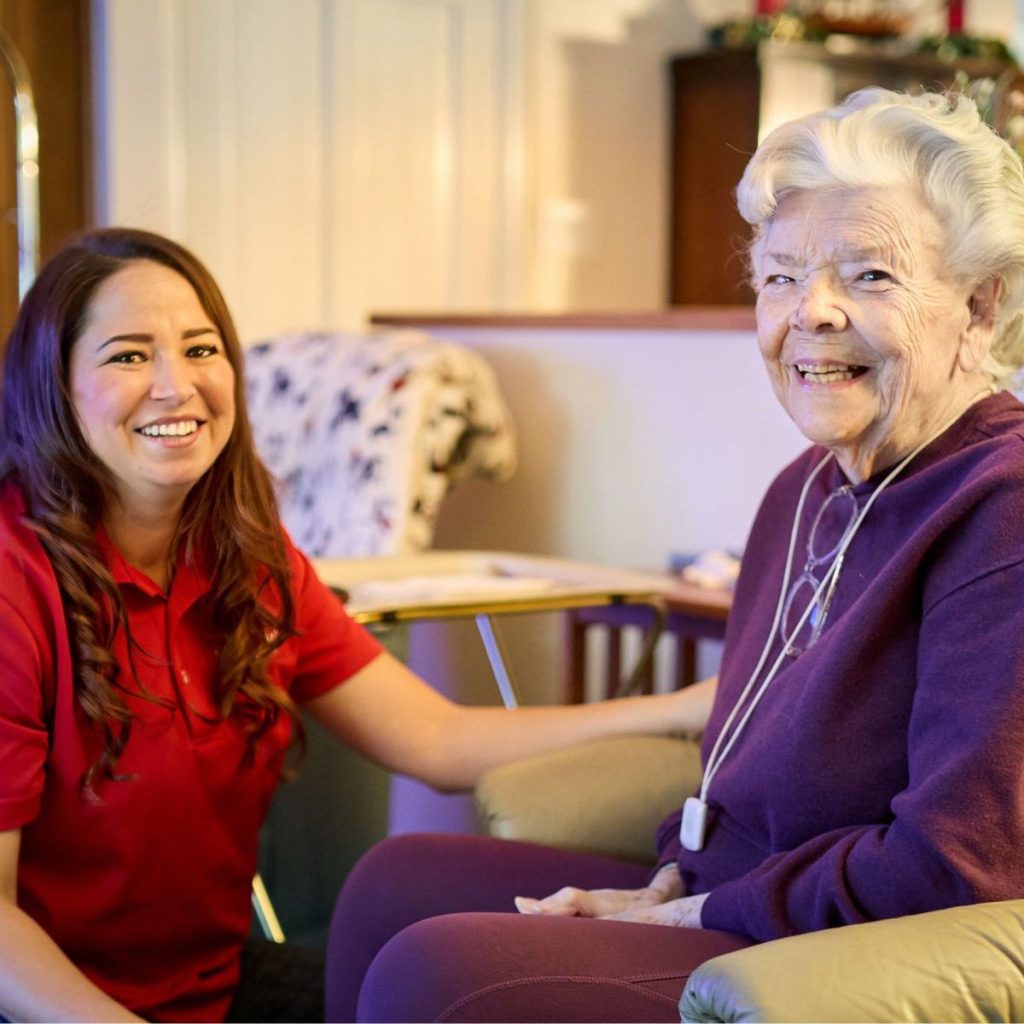If you’re researching dementia home care options for a loved one in the Denver metro area, you’re not alone.
For over two decades, Rhythms Home Care has helped families navigate dementia care services with compassion, clarity, and expertise. This guide explores what to look for in dementia home care services and offers practical steps to help you choose the right home care with a vision for your loved one.
Dementia Home Care Services, Defined
Dementia home care refers to in-home support tailored to individuals living with dementia that include assisting with daily activities, helping to ensure safety, managing medications, and promoting emotional well-being.

Effective dementia care services combine trained caregivers, individualized care plans, predictable routines, clear communication, and ongoing caregiver support.
Being that dementia is a progressive condition characterized by a decline in cognitive function, memory loss, and changes in behavior and emotions that go beyond normal aging, the impact and complexity of the condition varies by individual.
With the right mix of care, resources, and planning, many families prefer to keep their loved one at home. Understanding the aging process and dementia can help families make informed decisions about when home care remains suitable and when additional support may be needed. However, there are also times when transitioning to a formal care setting becomes the safer option, which we cover below.
However, there are also times when transitioning to a formal care setting becomes the safer option, which we cover below.
Can dementia patients be cared for at home?
Yes, many people with dementia prefer to live at home with appropriate support.
A comprehensive, dementia home care service plan often includes:
- Trained in-home caregivers or agency staff
- Structured routine and safety modifications (home safety assessment, fall prevention)
- Medication management and coordination with clinicians
- Access to emergency contacts and crisis planning
- Community resources and caregiver support networks
- Regular reassessments to adjust the care plan as needs change
What can a caregiver do for someone with dementia?

There are a variety of activities and responsibilities for caregivers to provide dementia care services to their loved one from home.
Caregivers can:
- Assist with activities of daily living (ADLs) like bathing, dressing, grooming, eating, and mobility
- Provide supervision to reduce safety risks (medication adherence, wandering prevention, fall prevention)
- Implement structured routines and memory aids to minimize confusion
- Support communication using clear language, calm tone, and active listening
- Manage medical appointments, medications, and coordination with healthcare providers
- Offer emotional support, companionship, and engagement in familiar activities
- Arrange respite care or other dementia home care services to prevent caregiver burnout
Does Medicare cover home care for dementia patients?
Medicare typically covers certain home health services, including dementia home care services, if a physician orders them and the patient meets eligibility criteria.
This can include skilled nursing visits, physical therapy, and home health aide services, but it does not generally cover long-term custodial care or non-medical in-home support.
Costs for ongoing daily assistance, supervision, and memory care services not categorized as skilled care may be paid out-of-pocket or through supplemental insurance, Medicaid, or state programs. It’s essential to check the patient’s specific plan, understand the scope of service, and verify current coverage with a local Medicare/Medicaid office or a care navigator.
When is the Right Time to Move Someone with Dementia Into Care?
While most dementia care services start at home, there can come a point where it is safer to transfer care to a more long-term, formal care setting.
Consider alternative care options when:
- Safety risks are escalating and cannot be adequately managed at home (frequent wandering, dangerous behaviours, missed medications)
- The caregiver’s health or resources are strained to a point where the loved one’s safety or quality of life is compromised
- There is a need for 24/7 supervision, specialized memory care, or access to skilled medical interventions that exceed dementia home care capabilities
- The person required a level of clinical care (e.g., complex wound care, IV therapy, etc.) that is not feasible at home
- Home adaptations and in home dementia care costs become unsustainable
What to Look for in Dementia Home Care Services
Qualified, compassionate dementia-trained staff
- Look for agencies that employ caregivers with dementia-specific training, ongoing education, and certifications in dementia care or memory care.
- Ask about staff-to-patient ratios, supervision provided by a registered nurse or clinician, and processes for matching caregivers to clients based on personality, routines, and needs.
Comprehensive, individualized care plans

A strong dementia home care provider will develop a written care plan after a thorough assessment that incudes:
- Daily routines, safety measures, and activity plans
- Medication management and reminders
- Communication strategies tailored to the person’s needs
- Behavioral management approaches and de-escalation techniques
- Family education and caregiver support resources
Safety-first home environment and care protocols
- Expect a home safety assessment (lighting, fall hazards, secure exits) and a plan to implement practical modifications
- Check for medication safety protocols, incident reporting, and a clear process for emergencies
Clear communication and responsiveness
- The dementia home care service provider should provide consistent updates, access to a care coordinator, and a reliable point of contact.
- Ask about how they handle crisis, scheduling changes, and after-hours support
Caregiver support and respite
- Good programs incorporate caregiver education, access to respite care, and resources for stress relief and planning
Transparent pricing and coverage options
- Request a detailed care plan with itemized costs, as well as information about alternative or special plan options, Medicare/Medicaid coverage where applicable, and any co-pays or out-of-pocket expenses
- Inquire about cancellation policies and predictability of pricing
Community integration and mentorship
- Each program varies in their approach to dementia home care services. At Rhythms Home Care, each program operates under a philosophy that emphasizes personalized connection and communication, focusing on meaningful interactions and building trust so that each person receives the dignity, respect, and purpose they deserve.
How to Compare Dementia Care Services
There are many different types of care available based on the level of help or care that is needed.
Define Needs
- List daily tasks, safety concerns, cognition and communication needs, preferred routines, and medical considerations.
- There’s no shortage of information that can be obtained online. Research dementia care services on credible sites, like AARP or Alzheimers.gov, to gather perspective and information about your needs or preferences that you may not have considered yet.
Gather Options
- Compile a list of at least three reputable providers in your geographical location. Consider both home care agencies that provide dementia services and solo caregivers with verifiable references.
Interview and Assess
- Ask about training credentials, care plan development, staff assignment, back-up caregiver coverage, supervision, and how they handle medications and emergencies.
- Request a no-obligation, in-home assessment or evaluation to observe interaction quality and the practicality of dementia care services in your home.
Check References and Reviews
- Speak with current families and staff about reliability, responsiveness, and the impact on quality of life
- Do your research online to find testimonials or reviews of each program
Pilot Period
- If offered, consider a short trial-period or lower-commitment care plan option to evaluate fit before committing long-term
Plan for Transitions
- Ensure there is a documented plan for routine changes, seasonal needs, and future steps (home safety upgrades, memory care services, or a move to a memory care community if needed).
How Rhythms Home Care Supports Dementia Home Care Services in Denver, Colorado
Rhythms Home Care supports dementia home care in Denver through personalized, compassion-driven, home-based services that focus on maintaining independence in familiar surroundings, offering trained caregivers, customized care plans, and innovative engagement techniques.

We provide specialized support for the physical and emotional needs of individuals with memory challenges, adapting care to individual strengths, natural rhythms, and preferences.
Key aspects to our approach to dementia home care support include:
- Personalized care plans that recognize an individual’s distinct strengths and abilities based on their rhythm of life, using techniques such as validation, music or art to build a sense of passion and purpose.
- Trained and compassionate caregivers and staff that receive specific dementia support training and take the time to get to know each patient personally.
- Emphasis on aging-in-place, acknowledging the benefits of staying in a familiar home environment, especially for individuals in early stages of dementia
- Open communication with clients, families, and the internal care team to adjust care plans as needed.
- Flexible and scalable services ranging from a few hours a week to comprehensive, 24-hour support, allowing families to customize care to their specific needs and budget.
- Support services for families to provide much-needed relief and support for loved ones
What’s Next?
To move forward with confidence, start with a consultation. Contact Rhythms Home Care to discuss your loved one’s needs, safety, and preferences.
Be sure to determine eligibility for in-home dementia care services to clarify any insurance or Medicare-related options you can pursue. With this knowledge, begin drafting a dementia care plan that outlines activities and safety concerns, preferred communication style and routines, so that it’s easier to establish clear goals.
Don’t forget to explore caregiver support resources like respite options, training and support groups, and plan for contingencies by identifying emergency contacts and steps needed if a more formal care becomes necessary.
By taking these steps to research and reflect, you’ll build a proactive, practical, and person-centered path that supports safety, comfort, and quality of life for your loved one, while also safeguarding the well-being of the family caregiver.
We’d love to help you on this journey. Contact us today to learn more about dementia home care services with Rhythms Home Care.





